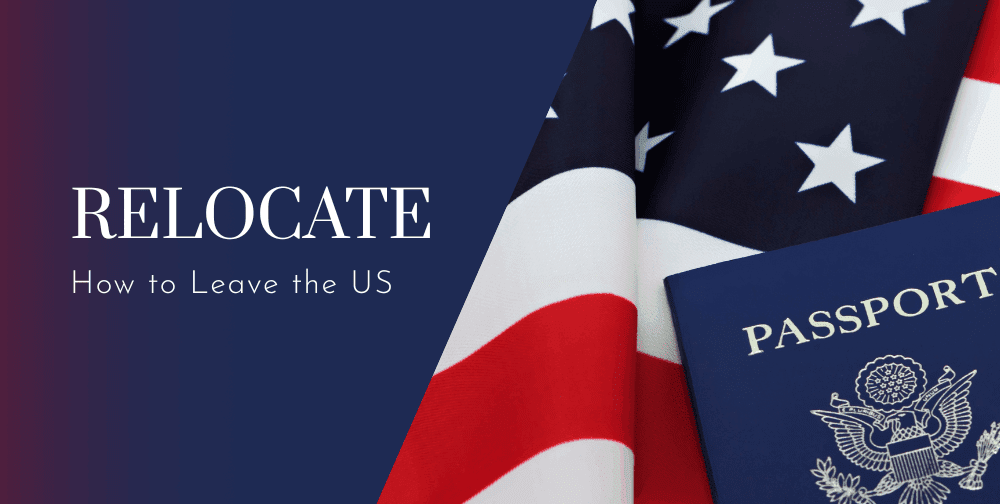How to Leave the US

People choose to relocate for different reasons — from the desire for safety and stability to seeking better education, healthcare, and freedom of movement. Regardless of the motivation, emigration is always a serious step that requires preparation and adaptation: finding housing and employment, learning the language, and integrating into a new culture.
Below, we explain which destinations are most popular and what you should consider before making the move.
Main Ways to Immigrate from America
To live abroad legally, you must obtain a residence permit (temporary or permanent). The grounds for legal residence depend on your goals and circumstances — investment, employment, study, or humanitarian reasons — each pathway has its own specifics.
Through Investment
Several countries operate “Golden Visa” programs, allowing you to obtain residency — or even citizenship — through investment in real estate or the economy. Residency by investment is one of the simplest and fastest routes to legalisation: there is no requirement to live in the country permanently, and the minimum stay periods are symbolic. The investor decides whether to become a tax resident, and in many cases, the invested funds can be recovered later by selling the asset.
Through Employment
Labour migration requires an invitation from a foreign company, which must prove that no local candidate could fill the position. The applicant must confirm their qualifications, education, work experience, and language skills. A residence permit is issued for the duration of the employment contract, and to extend it, the holder must spend most of the year living in the country.
Through Education
Students admitted to foreign universities can obtain a residence permit for the duration of their studies. In some countries, part-time work is permitted, and after graduation, it may be possible to extend the permit to seek employment. This is one of the most convenient ways to integrate abroad: graduates of local universities find it easier to secure jobs, and language and cultural immersion help with adaptation.
On Humanitarian Grounds
If a person faces persecution or threats in their home country, they may apply for asylum. This requires proof of danger and supporting documentation. The process can be lengthy, but if approved, applicants gain access to support programs, including housing, language courses, and employment assistance.
Where to Move from the United States of America?
Despite restrictions and sanctions, there are still many relocation options available. When choosing a destination, you should consider local prices and the cost of living — but overall expenses will depend largely on your lifestyle and personal goals. It’s important to assess not only housing costs but also expenses for food, healthcare, and education.
While theoretically you can move to almost any country, in practice there are many factors to consider — standard of living, climate, attitude towards foreigners, and residence rules. It’s helpful to research expat rankings, reviews from those who have already moved, economic indicators, and cultural nuances.
Popular Destinations
Northern European countries such as Denmark, Norway, and Switzerland lead in quality of life, healthcare, and education — but their cost of living is high and immigration rules are strict.
More affordable options include Eastern Europe, the Balkans, and Latin America — Armenia, Georgia, Serbia, Albania, and Argentina. These countries offer lower living costs, easier residency procedures, and a friendly attitude towards Russians. However, infrastructure and healthcare standards are generally below those of Western Europe.
Asian destinations such as Vietnam, Thailand, and Bali are also popular. They offer a warm climate, friendly locals, low prices for food and housing, relatively simple residency conditions, and plenty of opportunities for leisure. The main drawback is low local salaries — but for remote workers or business owners, life in these regions can be very comfortable.
Still, the quality of life may be lower than in nearby European countries, particularly in healthcare, education, and infrastructure outside capital cities. The main advantages for Russians are affordability, pleasant climate, rich culture, and good conditions for remote work or entrepreneurship.
For those seeking balance between comfort and cost, it’s worth considering countries ranked in the global top 20–40 for quality of life — such as Greece, Cyprus, Portugal, and Turkey. These destinations offer residency by investment, seaside living, access to European services, and the possibility of citizenship in the future.
Average monthly living costs for one person (excluding rent) range from €600–900, which is still lower than in Germany or France. Meanwhile, living standards are higher than in many regions, and expenses can be reduced through a smart approach — choosing housing outside tourist areas, shopping at local markets, and using public transport.
Popular Residency Programs among US Citizens
Greece
Greece’s “Golden Visa” program is among the most popular in the world. You can obtain a renewable 5-year residence permit by purchasing property worth at least €250,000. There is no requirement to reside in the country — a single visit for biometrics is enough. Greek residents can access local healthcare and education. Family members — spouse, children, and parents from both sides — can be included in the same application.
If you are considering relocation, after seven years (subject to certain conditions) you may apply for citizenship.
Cyprus
A permanent residence permit (PR) for yourself and your family can be obtained through a property purchase of at least €300,000 (excluding VAT). The property must be new and purchased directly from a developer; one or several units can be acquired. It is sufficient to visit Cyprus once every two years.
If you plan to relocate, you may apply for citizenship after eight years of residence, provided that all necessary conditions are met.
Cyprus offers a warm year-round climate, high living standards, affordable prices, a friendly population, and large expat communities.
Turkey
In Turkey, you can obtain a residence permit by purchasing property with a cadastral value of at least $200,000, and after five years of residence, you may apply for citizenship — provided you meet the required stay periods and pass a language test.
A residence permit in Turkey allows not only legal residence but also opening bank accounts, conducting international transactions, doing business in the country, and accessing the public healthcare and education systems.
If you don’t want to wait five years or pass the language test, you can apply directly for citizenship by purchasing property worth at least $400,000. In this case, language knowledge and permanent residence are not required. The property may be sold after three years while retaining citizenship.
A Turkish passport allows visa-free or visa-on-arrival access to 118 countries and grants equal rights to those of local citizens.
How to Move from the USA and Obtain Residency Abroad
Main Applicant Requirements
Applicants must have no criminal record and pose no threat to national security. They must also provide proof of good health. In most cases, sufficient financial means and a registered address (long-term rental or property ownership) are required.
The applicant must also prove their eligibility for residency, depending on the selected route.
With the exception of Golden Visa and other specific investment categories, most residence permits require continuous presence in the country — typically, absences cannot exceed six months per year.
Required Documents
Each country has its own document requirements, but in general, the list includes:
- Completed application form
- Valid passport
- Recent photographs
- Police clearance certificate
- Medical certificate
- Health insurance policy
- Lease agreement or property ownership documents
- Proof of eligibility for residency (e.g. university admission, employment contract)
- Family members’ documents (if included in the application)
- Proof of payment of state fees
- Evidence of sufficient income and financial stability
Conclusion
Choosing a country for relocation is a major decision that requires careful analysis. Before making your choice, study all aspects of life abroad — cost of living, quality of services, climate, culture, and immigration regulations. With the right preparation and a decision based on your needs, many countries can offer comfort, stability, and new opportunities.
Astons experts specialise in investment immigration and international real estate. Contact us for a free consultation — our professionals will answer your questions and help you find the best solution for your relocation and residency goals.




